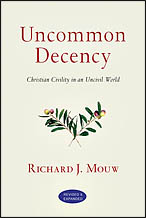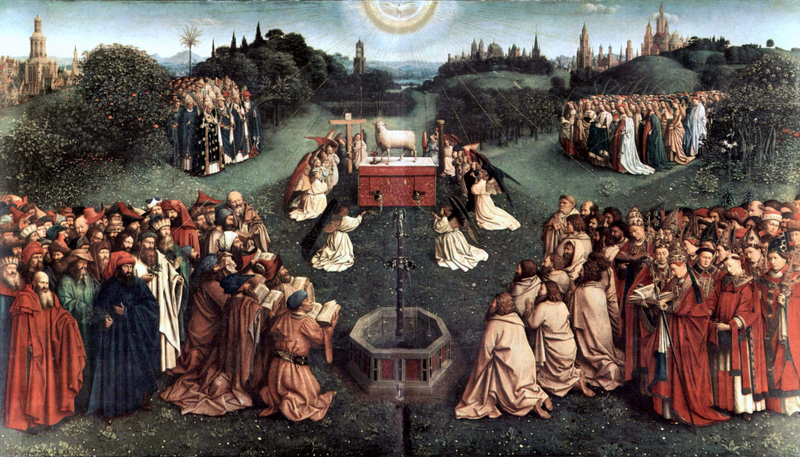
Christian hearts must be open to other people. God wants that of us. That is what I have just been arguing. But just how open are we supposed to be? We live today in the midst of many lifestyles, many systems of thought–don’t we run the risk of having our hearts pulled in so many different directions that we finally have no center of our own?” — Richard J. Mouw, Uncommon Decency: Christian Civility in an Uncivil World (Revised and Expanded, InterVarsity Press, 2010), 80.
It’s not surprising that Richard J. Mouw moves from the “Open Heart”, with a strong emphasis on empathy and an exploration of the spiritual underpinnings of Christian civility, to the “red flag” of and important daily realities of pluralism. Pluralism is an important topic which we have explored a number of times. I particularly appreciated Mouw’s brief exploration of What’s good about pluralism? (Ch 7):
- God and diversity
- Pluralistic consciousness
- Pluralism and idolatry
- Cultural diversity.
After a consideration of the framework offered in the first seven chapters of Uncommon Decency, I can imagine a campus context in which a weekly discussion group/dialogue delves into:
- How to be civil about sex (Ch 8)
- The challenge of other religions (Ch 9)
- Christian leadership in a pluralistic world (Ch 10)
- When there is no “On the other hand”: The limits of civility (Ch 11)
- Is hell uncivil? (Ch 12)
- Abraham Kuyper, Meet Mother Teresa: The problem of triumphalism (Ch 13)
- Serving a slow God: Civility and the end of time (Ch 14).
With today being Memorial Day, I am tempted to quote from Abraham Kuyper, Meet Mother Teresa: The problem of triumphalism (Ch 13), but I leave that as a teaser and pick up with Peter Berger’s related challenge that “the younger Mouw’s” call to radical obedience (i.e., “every Christian is called to engage in in radical obedience to God’s program of justice, righteouness and peace”) was “rather grandiose” (180). Mouw uses this not only as the conclusion to a consideration of manifesting public patience, i.e., serving a “slow God” instead of a “fast God”, but also the book as a whole. He gives attention to God calling us to deal with the challenges before us. He states:
often our most “radical” challenges are very “little” ones. Many times the call to radical obedience may mean patiently listening to someone who is boring or irritating, treating a fellows sinner with a charity that is not easy to muster, or offering detailed advice on a matter that seems trivial to everyone but the person who requested the advice (181).
How true and difficult for those of us in academic and campus ministry contexts
Encounters of this sort can be important occasions for reminding ourselves that we’re not asked to duplicate the epic work of the Lamb of God who takes away the sins of the world. The world already has one very adequate Savior. We are called to find our modest places in his larger program and to celebrate the signs of his gracious work wherever we see them–even, and perhaps especially, when their appearance is the occassion for puzzlement and wonder (181).

Amen! May we truly worship the lamb as our true savior each and every day of our life. Furthermore, may Mouw’s powerful statement of “what civility comes to” mark our lives:
This is what civility comes to, finally, an opennes to God’s surprises. When that openness marks our lives, we have learned patience–along with the flexibility and tentativeness and humility and awe and modesty that will inevitably come to the patient heart. And since none of this is possible without a clear sense of who we are, and to whom we belong, the patient heart will also be a place where convictedness has found its home (181).
To God be the glory!
Note 1: A follow-up to “The Lordship of Christ” (Richard J. Mouw), The Day for “Uncommon Decency” has come. Let’s embrace it!, and Cultivating empathic sensitivies vital to “Uncommon Decency”.
Note 2: If you desire to pick-up a copy of Uncommon Decency for summer and/or fall reading, be sure to use the 30% ESN Member Discount on InterVarsity Press (IVP) publications. If you have a book discussion group with interest in reviewing Uncommon Decency for ESN, please let me know.
Note 3: Looking forward to considering some material drawn from Richard J. Mouw’s When the Kings Come Marching In: Isaiah and the New Jerusalem (Wm. B. Eerdmans Publishing. 2002). Yes, this is part of developing A Theology of Higher Education 🙂
Update (5/26, 11:54 am): Title changed from The “Uncommon Decency” of Pluralism to “Uncommon Decency” in the context of Pluralism.
Tom enjoys daily conversations regarding living out the Biblical Story with his wife Theresa and their four girls, around the block, at Elizabethtown Brethren in Christ Church (where he teaches adult electives and co-leads a small group), among healthcare professionals as the Northeast Regional Director for the Christian Medical & Dental Associations (CMDA), and in higher ed as a volunteer with the Emerging Scholars Network (ESN). For a number of years, the Christian Medical Society / CMDA at Penn State College of Medicine was the hub of his ministry with CMDA. Note: Tom served with InterVarsity Christian Fellowship / USA for 20+ years, including 6+ years as the Associate Director of ESN. He has written for the ESN blog from its launch in August 2008. He has studied Biology (B.S.), Higher Education (M.A.), Spiritual Direction (Certificate), Spiritual Formation (M.A.R.), Ministry to Emerging Generations (D.Min.). To God be the glory!

The question always before us – is there anyone who can provide living proof that “uncommon decency in the midst of pluralism” is desirable and possible?
It seems to me that we might spend some time reflecting on Pope Francis and at the very least the photos at the website below from his visit to the Holy Land,
which include photos of him with his old friends, Argentine Rabbi Abraham Skorka and the leader of Argentina’s Muslim population Omar Abboud.
http://www.dailymail.co.uk/news/article-2639420/Pope-Francis-bows-head-prayer-Western-Wall-leaving-note-calling-peace-Christians-Muslims-Jews.html
Not only is Pope Francis speaking volumes in what he did this weekend, he spoke volumes in what he did for years.with his Jewish and Muslim friends in Argentina.
I am reminded of Jesus’ parables about the Good Samaritan [at a time when all Samaritans were thought of as far from good] and in Matthew 25, the King dividing the sheep from the goats, those who cared for all those in need [irrespective of all the things that divide us today] and those who did not,
those, Jesus said, who said, “’Lord, when did we see you hungry and feed you …”
to whom Jesus said, “The King will reply, ’Truly I tell you, whatever you did
for one of the ***least of these*** brothers and sisters of mine, you did for me.’
We have a model for “uncommon decency in the midst of pluralism” – will we learn anything from him?